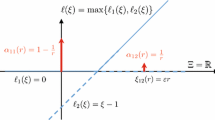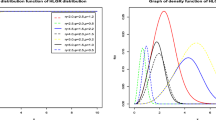Abstract
The discretization of a continuous distribution is an important and challenging step in problems emerging from different fields, like, e.g., finance and insurance. The usual discretization methods come along with some information loss. With the purpose to capture more information by covering the entire support of the original distribution while keeping the discrete characteristic, in this paper, we propose a fuzzy alternative discretization method that—in terms of random variables—replaces a discretized random variable with a discrete triangular fuzzy random variable. As applications, we insert this discrete triangular fuzzy random variable in two classical risk models and study the results.










Similar content being viewed by others
Data Availability
Not applicable.
References
Asmussen S, Albrecher H (2010) Ruin probabilities. World Scientific Publishing Co., Singapore
Berry-Stölzle TR, Koissi MC, Shapiro AF (2010) Detecting fuzzy relationships in regression models: the case of insurer solvency surveillance in Germany. Insur Math Econ 46(3):554–567
Courtois C, Denuit M (2007) Local moment matching and s-convex extrema. ASTIN Bull 37(2):387–404
De Andrés-Sánchez J (2014) Fuzzy claim reserving in non-life insurance. Comput Sci Inf Syst 11(2):825–838
De Andrés-Sánchez J, Puchades LGV (2017) The valuation of life contingencies: a symmetrical triangular fuzzy approximation. Insur Math Econ 72:83–94
De Andrés-Sánchez J, Puchades LGV, Zhang A (2020) Incorporating fuzzy information in pricing substandard annuities. Comput Ind Eng 145:106475
Dutang C, Goulet V, Pigeon M (2008) actuar: an R package for actuarial science. J Stat Softw 25(7):1–37
Embrechts P, Frei M (2009) Panjer recursion versus FFT for compound distributions. Math Methods Oper Res 69(3):497–508
Gil-Lafuente AM (2005) Fuzzy logic in financial analysis. Springer, Berlin
Huang T, Zhao R, Tang W (2009) Risk model with fuzzy random individual claim amount. Eur J Oper Res 192:879–890
Katagiri H, Kato K, Uno T (2017) Possibility/necessity-based probabilistic expectation models for linear programming problems with discrete fuzzy random variables. Symmetry 9(11):254
Klugman SA, Panjer HH, Willmot GE (2012) Loss models: from data to decisions, vol 715. Wiley, New York
Kwakernaak H (1979) Fuzzy random variables-II. Algorithms and examples for the discrete case. Inf Sci 17(3):253–278
Luukka P, Collan M (2015) New fuzzy insurance pricing method for giga-investment project insurance. Insur Math Econ 65:22–29
Liu Y, Liu B (2003) Fuzzy random variables: a scalar expected value operator. Fuzzy Optim Decis Mak 2:143–160
Liu YK, Liu B (2005) On minimum-risk problems in fuzzy random decision systems. Comput Oper Res 32(2):257–283
Panjer HH, Lutek BW (1983) Practical aspects of stop-loss calculations. Insur Math Econ 2(3):159–177
Pouyakian M, Khatabakhsh A, Yazdi M, Zarei E (2022) Optimizing the allocation of risk control measures using fuzzy MCDM approach: review and application. Linguistic methods under fuzzy information in system safety and reliability analysis, pp 53–89
Puri M, Ralescu D (1986) Fuzzy random variables. J Math Anal Appl 114:409–422
Sanchez-Roger M, Oliver-Alfonso MD, Sanchís-Pedregosa C (2019) Fuzzy logic and its uses in finance: A systematic review exploring its potential to deal with banking crises. Mathematics 7(11):1091
Shapiro AF, Jain LC (eds) (2003) Intelligent and other computational techniques in insurance: theory and applications, vol 6. World Scientific, Singapore
Shapiro AF (2013) Modeling future lifetime as a fuzzy random variable. Insur Math Econ 53(3):864–870
Ungureanu D, Vernic R (2015) On a fuzzy cash flow model with insurance applications. Decis Econ Finance 38(1):39–54
Vernic R (2016) Optimal investment with a constraint on ruin for a fuzzy discrete-time insurance risk model. Fuzzy Optim Decis Mak 15(2):195–217
Vernic R (2018) On risk measures and capital allocation for distributions depending on parameters with interval or fuzzy uncertainty. Appl Soft Comput 64:199–215
Villacorta PJ, González-Vila Puchades L, de Andrés-Sánchez J (2021) Fuzzy Markovian Bonus-Malus systems in non-life insurance. Mathematics 9(4):347
Vilar JL (2000) Arithmetization of distributions and linear goal programming. Insur Math Econ 27(1):113–122
Yao K, Qin Z (2015) A modified insurance risk process with uncertainty. Insur Math Econ 62:227–233
Yao K, Zhou J (2016) Ruin time of uncertain insurance risk process. IEEE Trans Fuzzy Syst 26(1):19–28
You C, Bo L (2022) Option pricing based on a type of fuzzy process. J Ambient Intell Humaniz Comput 13(8):3771–3785
Wang K, Zhou J, Ralescu DA (2017) Arithmetic operations for LR mixed fuzzy random variables via mean chance measure with applications. J Intell Fuzzy Syst 32(1):451–466
Wang B, Li Y, Watada J (2017) Multi-period portfolio selection with dynamic risk/expected-return level under fuzzy random uncertainty. Inf Sci 385:1–18
Wang B, Wang S, Watada J (2011) Fuzzy-portfolio-selection models with value-at-risk. IEEE Trans Fuzzy Syst 19(4):758–769
Acknowledgements
The author is very grateful to the referee for the valuable comments that helped to significantly improve the paper.
Funding
Not applicable.
Author information
Authors and Affiliations
Corresponding author
Ethics declarations
Conflict of interest
No potential conflicts of interest/competing interest.
Code availability
Not applicable.
Additional information
Communicated by Leonardo Tomazeli Duarte.
Publisher's Note
Springer Nature remains neutral with regard to jurisdictional claims in published maps and institutional affiliations.
Rights and permissions
Springer Nature or its licensor (e.g. a society or other partner) holds exclusive rights to this article under a publishing agreement with the author(s) or other rightsholder(s); author self-archiving of the accepted manuscript version of this article is solely governed by the terms of such publishing agreement and applicable law.
About this article
Cite this article
Vernic, R. On a fuzzy discretization of continuous distributions with applications to risk models. Comp. Appl. Math. 42, 61 (2023). https://doi.org/10.1007/s40314-023-02190-4
Received:
Revised:
Accepted:
Published:
DOI: https://doi.org/10.1007/s40314-023-02190-4
Keywords
- Discretization method
- Triangular fuzzy number
- Triangular fuzzy random variable
- Fuzzy risk models
- Ruin evaluation




